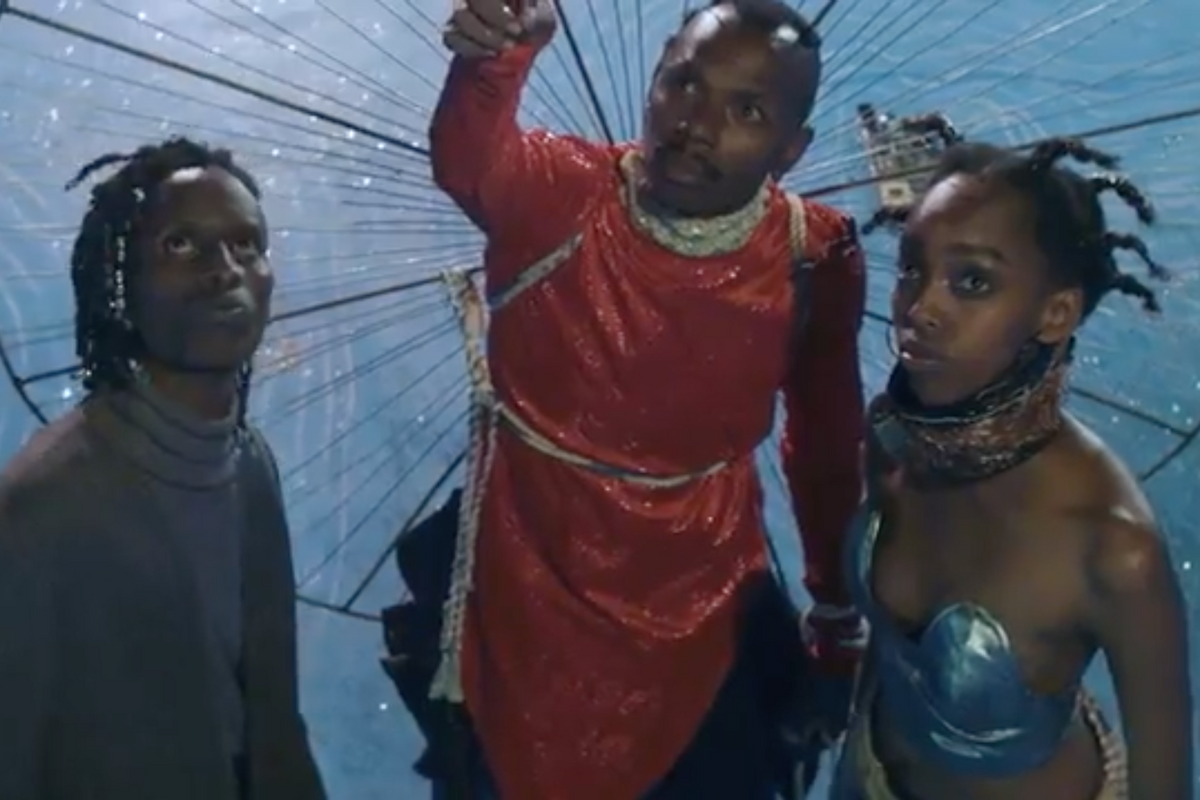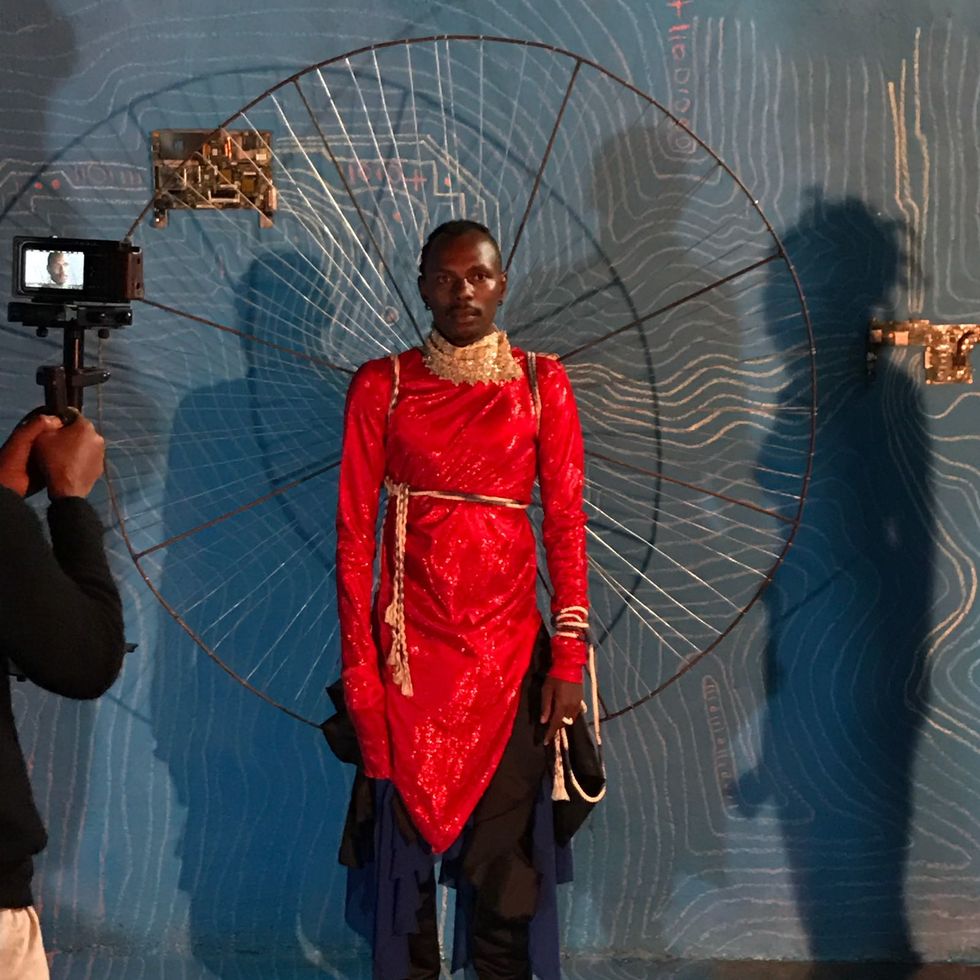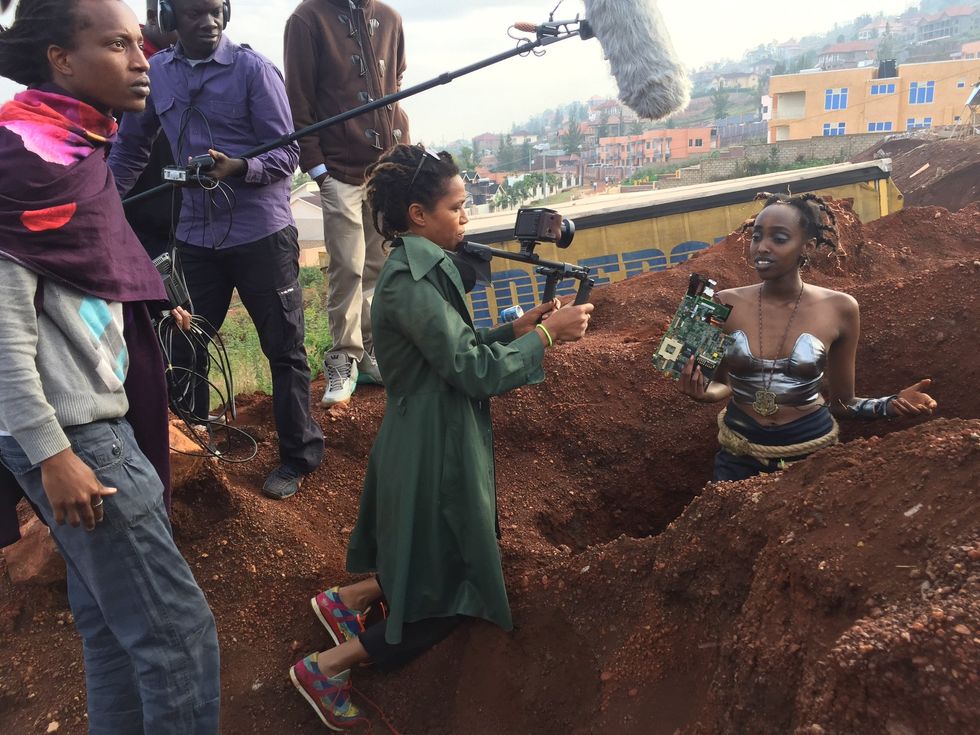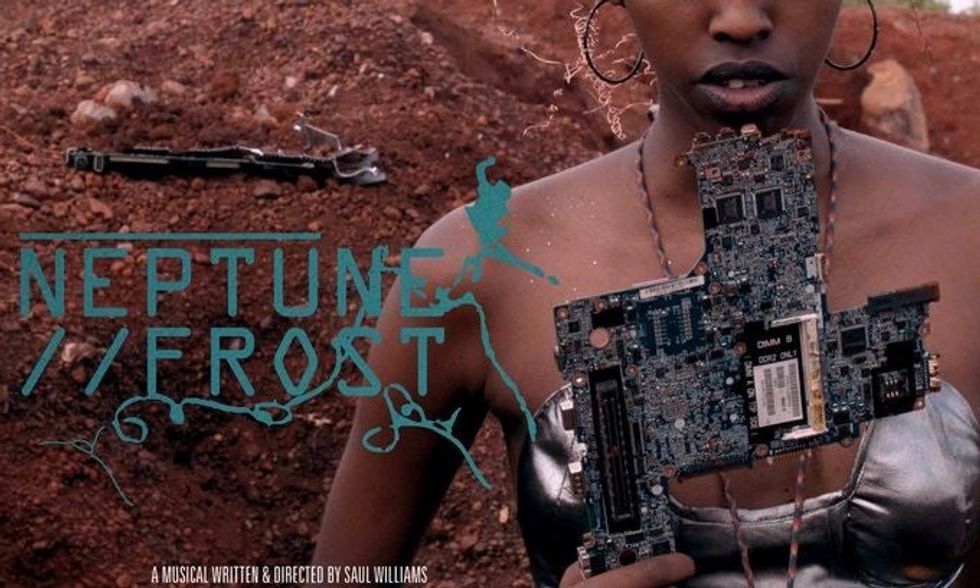A Sci-Fi Film About an Otherworldly Village Made of Old Computer Parts In Burundi By Saul Williams Is In The Works
We catch up with the artist, poet and filmmaker to get the scoop on his film in development, 'Neptune Frost.'

MartyrLoserKing is Saul Williams' overarching multimedia project that he began 5 years ago, consisting of a graphic novel, three albums and a musical.
The musical arm of the project—Neptune Frost—has been in development, where Williams shot the trailer in Rwanda and launched a Kickstarter to raise funds to begin production of the full-length film, which he hopes to begin in 2019.
Neptune Frost is set in a Burundian village made of recycled computer parts. This village is also home to what the synopsis calls, "the world's most subversive hacking collective." The sci-fi film tells the love story between an intersex runaway and a coltan miner.
The plot continues:
While Western intelligence looks to the usual suspects, a Dogon avatar whispers through a dream to reveal the coded mysteries of Sirius and the stars to an escaped coltan miner and an intersex runaway seeking refuge from a binary norm, revealing her divine circuitry as the eye of the storm. When their connection sparks the MartyrLoserKing is born.
MartyrLoserKing, the elusive African hacker whose team of "losers" and outcasts ignite the imagination of the world's most "connected" generation through deep space, deep web penetration. A virtual hero for a world caught in perpetual analogue exploitation. Neptune Frost is the MartyrLoserKing.
Watch the trailer below.
Just from watching the trailer alone, Williams is abstractly turning the impact of the world's consumption of the continent's precious minerals on its head, and we had to learn more.
Read our conversation where we touch on what inspired this project, shooting the trailer in Rwanda and more, below.
This interview has been edited and condensed for length and clarity.
Antoinette Isama for OkayAfrica: My first question touches on the setting of the film and the shooting location. Why did you want to head to Rwanda?
Saul Williams: Part of it has to do with the fact that people in the West know very little about that side of the world or even that side of the continent. For example, as African Americans, oftentimes our focus is so much heavily on West Africa. I was particularly interested in that region, one, because I was in the process of learning a lot about it. I was learning a lot about what was happening with a lot of the precious minerals and resources and also learning about the history of the region. I found it extremely interesting primarily because there's so many ways in which you connect how people move through history in one culture to another.
I chose Burundi because I know that it's relatively unknown for Western students, let's say. Americans are famous for not having a great sense of geography. It's a rich and beautiful history, and it's also paralleled to the history of Rwanda. Rwanda, like Haiti, [are] countries when you say their name, you have an immediate, "Oh, I heard about that place," but you associate it with tragedy. You associate it with some sort of natural or unnatural disaster. Part of the goal of this project is to transcend how we relate to these places so that the first thing we think of is not the horror and the sense of history, but we're able to apply our imagination and to project that into the future, because that's often of interest to the people from those places as well.
My family is from Haiti. When I say Haiti to anybody, they go, "Oh, how is it over there? Oh my god, the earthquake," but they don't realize how beautiful the island is. They don't realize that of all the islands that Columbus "discovered," there's a reason why he chose to live on that island, why he asked, of all the places, could I just live here, because it's a paradise.

The real reason though for basing it in Burundi was if I place it in a place that you were familiar with, like if I said it takes place in the Congo, you think that I'm doing some investigative journalism, exposé of what's happening in coltan mines. If I say it's in Rwanda, you go, "Oh, okay, the genocide." But if I say Burundi, your imagination is free because you don't really have too much associated with that place. It has to do with that. It also has to do with the plain fact that I'm from a place called Newburgh, New York. Newburgh is about an hour outside of New York City. Nobody's every really heard of it, but Newburgh for the past 40 years has had the highest murder rate, the highest crime rate, the highest drug trafficking rate in New York state. It's the most violent place in New York, but no one's ever heard of it. I'm interested in those sort of places that are unheard of but are actually the key to understanding something. That was that. I chose Burundi to free the imagination.
Of course, we can't shoot there because of the political upheaval [in Burundi]. Rwanda, of course, is an interesting place right now in that it's the fastest growing economy on the continent. It's the country in the world with the highest representation of women in the government. It's the third greenest country in the world. There's a bunch of shit about Rwanda that also people don't know beyond the trajectory of tragedy.
Also, when people think about Rwanda, they think about their president who is a complex leader in a lot of ways.
It's complex. Yeah, it's complex.
In terms of the dissent in that country is discouraged, and the trailer pokes at that in a lot of ways. How were you able to reconcile that while shooting it there?
How were we able to circumvent that? One, there's no place we could go to escape the craziness of what many countries and governments are invested and involved in. I we shot anything in the States, in Canada, anywhere we'd go, we'd be uncovering or unveiling something related to what's actually happening in the place. I think the way that it works for us is primarily because it's normal for the press to be interested in the fact that yes, we're talking about the coltan and all this sort of stuff, but our story is supernatural. It's a science fiction story, you know what I'm saying? It's really about a group of people that live in a village made of old computer parts that when this one person walks into the village, the entire village turns on and it becomes this supercomputer, which is then the most connected place on the planet and unexpected because it's in a place where people would automatically assume there's no way technology like that could exist.
It's been my job to do all the research to connect all of the realistic and historical referencing that points to the real shit that's going down, but simultaneously I'm not doing a documentary. I'm not even staying close to reality as we practice it. I think that's how we've been able to circumvent any issues thus far. If you think that we are not aware of all that could happen —of course, we move strategically. We give as much information as is needed. It's a game. When Fela Kuti said that music is the weapon of the future, we're aware of what we're building.

In terms of the folks we see in the trailer, are you planning on working with them again when you're able to go back to shoot the full film?
Definitely. We spent about three months scouting and casting in Rwanda. We ended up meeting some amazing talent. It's another thing that I've had to dodge not through media but definitely with people on Twitter and stuff like that where, "Oh, it's such good that you're doing work in Africa." They want to treat it like we found kids on the street or something, you know what I'm saying?
Actually, we found very well-trained artists and performance artists who are fucking amazing who were already on their path, you know what I'm saying? Some of them have albums. Some of them have already been in films. Many of them do theater. It's just a lot of talent, a lot of talent. Because of the fact that at the time of our being there, there was already over 300,000 Burundian refugees in Rwanda, [so] we ended up meeting a lot of Burundian talent as well. We were just in the right place at the right time to meet a lot of great talent. We have a lot more casting to do, so there's other people that we plan to include. But as far as the people that we worked with, yes.
The other side of that is that the real reason that I'm coming to people has everything to do with them, because when I go to producers and people with money who want to invest, their main thing in securing their investment is, "What type of A-list talent do you have, and how can you ensure me that it's going to be, one, in English." Those are the two things I'm not interested in. I'm trying to make a film that actually reflects my experience. My experience when I travel abroad is, one, centered around the fact that oftentimes I'm sitting at tables with people, African people oftentimes, who are speaking four or five different languages within one conversation, right?
I've experienced that, too.
I want to film that reflects that. It just seems like the most obvious thing to be like, "Holy shit, this is amazing." Why not have a film that reflects that? I'm super interested in that. I'm super interested in their faces. I get so mad when I step into a sci-fi film and the first face is see is fucking Matt Damon. How am I supposed to release my imagination if it's this motherfucker I see every fucking day? I want my imagination to be able to travel, so I think fresh faces, fresh voices, all of those things. Then as a poet, which is what nobody agrees with me on, but at as a poet, I love text on the screen. I love subtitles. I feel like people don't go far enough with subtitles. I want to see text on screen. I'm playing with language and all of these things.

One thing I already noticed with the trailer is how one of the actors was trying to describe the word "hack," and then you would hear "hack" again in Kinyarwanda. The translation between the two, I thought, was interesting.
All of those things, all of those little interpretations, translations, those things are like little portals, or windows, or vortexes that allow insights into things. It's definitely been my secret of my relationship to language of how I'd learned things is by having learned more than one language. You start getting the little peephole into, "Ah, this word comes from there, and it's related to that. In this language, it belongs to this expression, but that expression doesn't exist in this language. There's no word for that in this language."
Through all of those things, you start to understand culture, and self, and identity through all of those little portals.
Over the past, I would say, two or so years, maybe a bit more than that, there's been an increased interest in sci-fi through the black lens, Afrofuturism, and that whole discourse, whether it's expressed through music, through literature, through film. I was just wondering your thoughts on how this project, not just the film but the multimedia project, adds to that discourse, especially for those who aren't super familiar but are interested in that realm.
When I was in a prison yard in the film Slam going, "I stand on a corner of the block slinging amethyst rocks," my interest then—20 years ago—was all black sci-fi, Octavia Butler, Sun Ra. I've been waiting for this public interest to arise in what we're now terming "Afrofuturism." I don't give a fuck what you call it. I think there's an American tent to that term. I think it comes from a Western gaze, where the idea of what others might called "magical realism" or what have you has existed in other cultures and in African cultures in particular for eons.
The Dogon, for example, from Mali who in their cosmology say that they come from the planet Sirius, whose numerological system is binary: zero, one, zero, one, zero, one, zero, one—and it's been that way for 2,000 years. Many indigenous cultures have been on some space age shit for ages, before the Jesuits and colonizers and came and whipped it out of them. I'm just happy to see it come back.
This film speaks to all of that. That's the inspiration point of this film was to talk about yeah, okay, we know that this stone coltan has power in a real sense, but what if somebody could touch the stone and feel its power the same way that when you touch crystal and feel its power or feel its history and feel it projecting into where it will be?
If you could touch the stone and see 10,000 years in the future and see every cell phone it will go into, every drone, every whatever, what if you could have some sort of connection to the stone before it's ever used by some sort of industrial tool to pull out those resources? What if someone could touch it and feel that?
When I think about the richness of the soil on the continent and all of the rare metals that are pulled from there, don't you think that there's something that's felt through the feet when you walk through the soil there? Don't you think it affects the music, the language, the culture? It's not just what's pulled out by the sheen. The future is as much behind, as it is ahead, as it is in the present.
It's all there. I think it's been space age for a long time.
*
Saul Williams has surpassed his goal on Kickstarter but is looking to raise more funds privately. With four days left in the campaign, you can still donate and learn more about the project on Kickstarter here. Look out for the graphic novel in September 2019, which will be published through First Second Books, a subsidiary of Macmillan Press.

